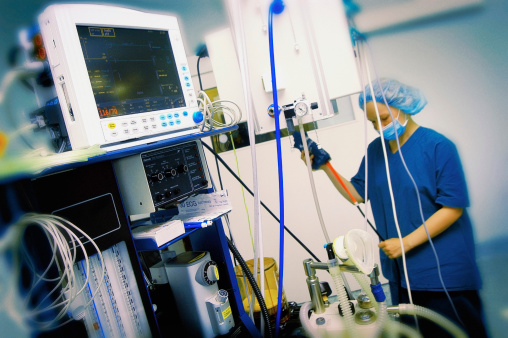7. BRINGING INTELLIGENCE TO MEDICAL DEVICES AND MACHINES

Smart devices are taking over the consumer environment, offering everything from real-time video from the inside of a refrigerator to cars that can detect when the driver is distracted.
In the medical environment, smart devices are critical for monitoring patients in the ICU and elsewhere. Using artificial intelligence to enhance the ability to identify deterioration, suggest that sepsis is taking hold, or sense the development of complications can significantly improve outcomes and may reduce costs related to hospital-acquired condition penalties.
“When we’re talking about integrating disparate data from across the healthcare system, integrating it, and generating an alert that would alert an ICU doctor to intervene early on – the aggregation of that data is not something that a human can do very well,” said Mark Michalski, MD, Executive Director of the MGH & BWH Center for Clinical Data Science.
Inserting intelligent algorithms into these devices can reduce cognitive burdens for physicians while ensuring that patients receive care in as timely a manner as possible.
8. ADVANCING THE USE OF IMMUNOTHERAPY FOR CANCER TREATMENT
![]()
Immunotherapy is one of the most promising avenues for treating cancer. By using the body’s own immune system to attack malignancies, patients may be able to beat stubborn tumors. However, only a small number of patients respond to current immunotherapy options, and oncologists still do not have a precise and reliable method for identifying which patients will benefit from this option.
Machine learning algorithms and their ability to synthesize highly complex datasets may be able to illuminate new options for targeting therapies to an individual’s unique genetic makeup.
“Recently, the most exciting development has been checkpoint inhibitors, which block some of the proteins made by some times of immune cells,” explained Long Le, MD, PhD, Director of Computational Pathology and Technology Development at the MGH Center for Integrated Diagnostics. “But we still don’t understand all of the disease biology. This is a very complex problem.”
“We definitely need more patient data. The therapies are relatively new, so not a lot of patients have actually been put on these drugs. So whether we need to integrate data within one institution or across multiple institutions is going to be a key factor in terms of augmenting the patient population to drive the modeling process.”